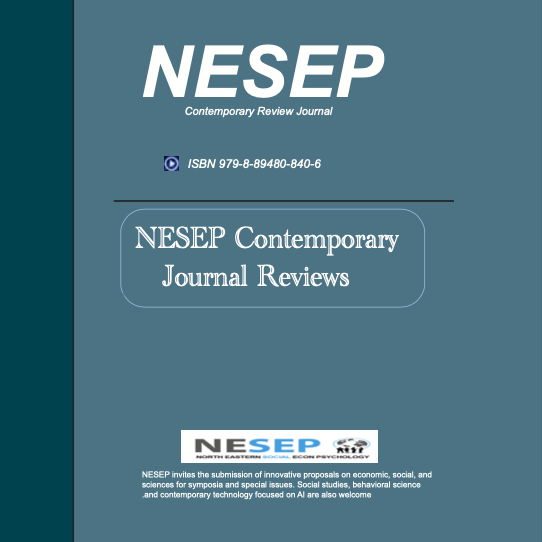Accepted Articles
We congratulate you on acceptance of your manuscript.

Annual Expo by the Journal of Young Explorers Meta and NESEP
- Fundamental or applied research
- Interdisciplinary research
- Judging on a rolling basis
- A work-in-progress research
- Completed research
- Unlimited topics and ideas
- ISBN 979-8-89480-840-6
- NESEP/NY-CSEF event at Harvard Club in NYC
Protecting Unionization Through Labor Law Reform
Abstract: This paper will examine the effect of critical moments in the American history of unionization on today’s political and economic landscapes pertaining to labor unions; numerous acts, such as the National Labor Relations Act of 1935 have legitimized union activities. Upon examination, this paper will analyze how the modern political and economic landscapes regarding American labor unions impact the effectiveness of organizing; unethical employer tactics decrease the likelihood of success for unions. Lastly, this essay inspects the possible benefits of specific actions that could be taken to strengthen the labor movement. In 1935, the National Labor Relations Act (NLRA) was signed into law marking a significant moment in the history of American unions as workers’ right to unionize was legitimized. In 1947, a different shift in the landscape of unions occurred under the Taft-Hartley Act which restricted certain union activities in some states.
In recent times, the economic and political landscapes pertaining to labor unions have been plagued by numerous factors creating an uphill battle for organizing workers. However, in 2021, the US House of Representatives passed the Protecting the Right to Organize (PRO) Act, restricting the egregious methods commonly applied by employers to oppose unions. It was observed that attempts to unionize were generally met with employer retaliation. Varying unethical tactics were employed to dissuade workers from unionizing, such as holding mandatory anti-union meetings and excessive stalling. Such attempts were generally fruitful due to a paucity of sufficient punishment.
As unions are helpful in combating the mistreatment of workers and provide a stronger say for employees in voicing their needs, I believe there should be more legal repercussions for those who violate labor law.
Keywords: Labor unions, Labor law reform, Political landscape, Harvard Labor Reform Project’s proposal, Labor law policies
References
-
Block, S. & Sachs, B. (2019). Executive Summary of Clean slate for worker power. Clean Slate for Worker Power. Retrieved August 10, 2022, from https://www.cleanslateworkerpower.org/
-
A Brief History of Labor, Race and Solidarity. Labor Commission on Racial and Economic Justice. (2017, January 13). Retrieved August 10, 2022, from https://racial-justice.aflcio.org/blog/est-aliquid-se-ipsum-flagitiosum-etiamsi-nulla
-
A Brief History of Unions. Union Plus. Retrieved August 10, 2022, from https://www.unionplus.org/page/brief-history-unions
-
Conerly, B. (2022, Feb). Starbucks with Labor Unions: Lessons for Other Business. Retrieved. Forbes. August 10, 2022, from https://www.forbes.com/sites/billconerly/2022/02/22/starbucks-with-labor-unions-lessons-for-other-business/?sh=4bcfad4c4e84
-
Goldfield, M., & Bromsen, A. (2013). The changing landscape of US unions in historical and Theoretical Perspective. Annual Review of Political Science, 16(1), 231-257. doi:10.1146/annurev-polisci-032211-214003
-
Hafiz, H. (2021). Structural labor rights. Michigan Law Review, (119.4), 651. doi:10.36644/mlr.119.4.structural
-
Jorgenson, K. (2017). Labor Law for Whom? Interest Group Politics and the Wagner Act. Retrieved August 10, 2022, from https://digitalcommons.tacoma.uw.edu/ppe_prize/9
-
Lafer, G., & Loustaunau, L. (2020, July). Fear at work. Economic Policy Institute. https://files.epi.org/pdf/202305.pdf
-
Paschal, O. (2021, Mar). The Pro Act would undo decades of southern anti-union laws rooted in racism. Retrieved August 10, 2022, from https://www.facingsouth.org/2021/03/pro-act-would-undo-decades-southern-anti-union-laws-rooted-racism
-
Poydock, M., Mangundayao, I., McNicholas, C., & Schmitt, J. (2022, Feb). Data show major strike activity increased in 2021 but remains below pre-pandemic levels: Many worker actions were not captured in the data. Economic Policy Institute. Retrieved August 10, 2022, from https://www.epi.org/publication/2021-work-stoppages/
-
The Pro Act: Bad for Workers, Bad for Businesses. (2021, Mar). Retrieved August 10, 2022, from https://www.rpc.senate.gov/policy-papers/the-pro-act-bad-for-workers-bad-for-businesses
-
Noor, M.. (2022, June). How would the looming recession impact strides in the labor market? Prism. Retrieved August 10, 2022, from https://prismreports.org/2022/06/23/looming-recession-impact-labor-market/
-
Rosenbaum, E. The Amazon, Starbucks, Apple Union Push Is Capturing What a Majority of All American Workers Now Say They Want. (2022, June), from https://www.cnbc.com/2022/06/02/majority-of-american-workers-want-more-unionization-at-their-own-jobs.html